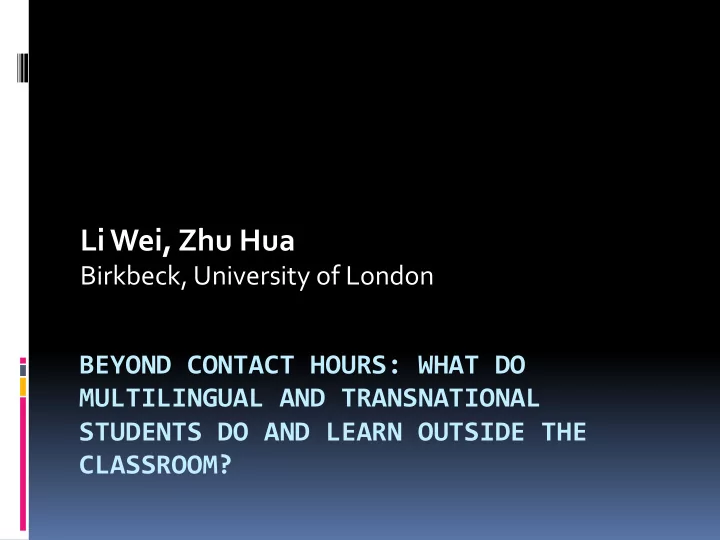

Li ¡Wei, ¡Zhu ¡Hua ¡ Birkbeck, ¡University ¡of ¡London ¡ ¡ ¡ BEYOND ¡CONTACT ¡HOURS: ¡WHAT ¡DO ¡ MULTILINGUAL ¡AND ¡TRANSNATIONAL ¡ STUDENTS ¡DO ¡AND ¡LEARN ¡OUTSIDE ¡THE ¡ CLASSROOM? ¡
The ¡commodification ¡of ¡ ‘contact ¡hours’ ¡ § A ¡selling ¡point ¡in ¡the ¡new ¡fees ¡regime ¡ § Essentially ¡lecturing/seminar ¡hours ¡– ¡face-‑to-‑face ¡ contact ¡with ¡staff ¡(one-‑to-‑one ¡tutorials ¡is ¡another ¡ commodified ¡practice) ¡ § The ¡more ¡the ¡better ¡(money ¡worth) ¡ § 1 ¡credit ¡point ¡= ¡1 ¡hour ¡of ¡contact ¡ § Class ¡register ¡ § For ¡international ¡students, ¡direct ¡link ¡between ¡contact ¡ and ¡visa ¡
Questions ¡ § Where ¡has ¡the ¡‘learning ¡hours’ ¡gone? ¡ § Does ¡learning ¡take ¡place ¡beyond ¡the ¡ classroom? ¡(if ¡Yes, ¡what ¡kind?) ¡ § Can/should ¡learning ¡be ¡quantified ¡in ¡terms ¡of ¡ time? ¡
Our ¡research ¡interests ¡ § Not ¡in ¡contact ¡hours ¡per ¡se ¡ § But ¡in ¡communicative ¡practices ¡amongst ¡multilingual, ¡ transnational ¡students ¡ § Ethnographic ¡research, ¡following ¡personal ¡social ¡ networks, ¡plus ¡‘conversations’ ¡(cf. ¡interviews) ¡ § Their ¡social ¡networks ¡are ¡not ¡entirely ¡for ¡‘leisure’ ¡ § A ¡great ¡deal ¡of ¡‘learning’ ¡takes ¡place, ¡and ¡multilingually! ¡ § Outside ¡formal ¡‘contact ¡hours’ ¡
§ For ¡the ¡present ¡topic, ¡in-‑class ¡(formal) ¡and ¡ informal ¡discussions ¡with ¡a ¡totally ¡unscientific ¡ sample ¡of ¡BBK’s ¡MA ¡students ¡ § Themes: ¡ § Importance ¡of ¡contact ¡with ¡staff ¡ § Learning ¡outside ¡the ¡classroom: ¡where, ¡what, ¡ with ¡whom ¡and ¡how ¡ § What’s ¡not ¡mentioned ¡
Importance ¡of ¡contact ¡with ¡ staff ¡ § Dependent ¡on ¡purpose ¡ § One ¡to ¡one ¡contact ¡important ¡during ¡dissertation/project ¡ § Attending ¡lectures ¡important, ¡but ¡reading ¡is ¡equally ¡ important ¡ § Maintaining ¡contact ¡with ¡admin ¡staff ¡very ¡important ¡for ¡ timetable ¡issues, ¡location ¡of ¡lectures, ¡attendance, ¡ assignment ¡etc. ¡ § Generally, ¡not ¡the ¡more ¡the ¡better ¡(cf. ¡undergrads, ¡full-‑ timers) ¡
§ Cultural ¡differences: ¡ § Some ¡international ¡students ¡are ¡used ¡to ¡(but ¡ not ¡necessarily ¡happy ¡with) ¡lots ¡of ¡courses ¡ hence ¡lots ¡of ¡contact ¡hours ¡in ¡their ¡home ¡ countries ¡ § Set ¡textbooks ¡and ¡fixed ¡course ¡menu/groups ¡ § Restricted ¡access ¡to ¡range ¡of ¡reading ¡material ¡
Learning ¡outside ¡the ¡ classroom ¡ § Definitely ¡a ¡great ¡deal ¡of ¡learning ¡takes ¡place ¡ outside ¡the ¡classroom ¡ § Can’t ¡imagine ¡learning ¡in ¡the ¡classroom ¡only ¡ § Learning ¡about ¡society ¡and ¡culture ¡equally ¡ important, ¡particularly ¡for ¡multilingual, ¡ transnational ¡students, ¡as ¡learning ¡about ¡the ¡ subject ¡
Where, ¡what, ¡with ¡whom ¡and ¡ how? ¡ § Friendship ¡groups/social ¡networks ¡– ¡both ¡ academic ¡(!) ¡and ¡socio-‑cultural ¡learning ¡ § Internet, ¡a ¡key ¡learning ¡resource, ¡for ¡academic ¡ learning ¡ § AND ¡multilingual! ¡Resources ¡in ¡languages ¡other ¡ than ¡English ¡available ¡on ¡the ¡internet, ¡and ¡ students ¡do ¡use ¡translation ¡in ¡learning ¡ § Library ¡– ¡access ¡to ¡books ¡and ¡journals ¡is ¡ important, ¡but ¡they ¡don’t ¡spend ¡long ¡hours ¡in ¡ the ¡library ¡
§ Social ¡media ¡for ¡learning, ¡asking ¡each ¡other ¡ questions ¡ § Global ¡networks ¡– ¡contacts ¡with ¡students ¡in ¡ North ¡America, ¡Australia, ¡back ¡in ¡their ¡home ¡ countries, ¡and ¡other ¡universities ¡in ¡the ¡UK, ¡ again ¡multilingually! ¡ § People ¡one ¡lives ¡with, ¡e.g. ¡flatmates ¡
What’s ¡not ¡mentioned ¡as ¡key ¡ § Contacts ¡with ¡others ¡on ¡the ¡same ¡course ¡ § Personal ¡tutors ¡(cf ¡undergrads?) ¡ § Fixed ¡textbooks ¡ § Staff-‑led/organised ¡seminars/tutorials, ¡ though ¡they ¡organise ¡informal ¡groups ¡ themselves ¡ § They ¡prefer ¡asking ¡questions ¡and ¡contacting ¡ people ¡as ¡they ¡go ¡(v.-‑as-‑you-‑go ¡approach) ¡
T’s ¡narrative ¡(MA ¡student ¡from ¡China) ¡ § At ¡first ¡I ¡was ¡worried ¡that ¡we ¡only ¡had ¡to ¡do ¡ four ¡modules. ¡But ¡there ¡is ¡a ¡lot ¡to ¡do ¡outside ¡ the ¡class. ¡We ¡have ¡to ¡read ¡a ¡lot. ¡I ¡normally ¡ discuss ¡things ¡with ¡friends. ¡I ¡know ¡quite ¡a ¡lot ¡of ¡ people ¡doing ¡applied ¡linguistics ¡in ¡Britain ¡and ¡ other ¡countries. ¡We ¡discuss ¡things ¡online ¡or ¡ weChat. ¡We ¡talk ¡in ¡Chinese. ¡I ¡also ¡find ¡ materials ¡in ¡Chinese ¡that ¡are ¡useful. ¡Of ¡course ¡ we ¡also ¡talk ¡about ¡shopping, ¡new ¡movies, ¡ holidays, ¡and ¡we ¡visit ¡each ¡other ¡during ¡ holiday ¡time ¡to ¡see ¡more ¡of ¡the ¡country . ¡
Issues ¡for ¡further ¡investigation ¡ § Learning ¡certainly ¡takes ¡place ¡outside ¡the ¡ class ¡contact ¡hours, ¡but ¡we ¡need ¡to ¡know ¡ more ¡of: ¡ § What’s ¡being ¡learned ¡ § With ¡whom ¡ § Through ¡what ¡medium ¡ § How ¡ § In ¡what ¡language(s) ¡
§ Understanding ¡ learning ¡beyond ¡contact ¡hours ¡ has ¡important ¡implications ¡for ¡policy ¡and ¡ practice ¡in ¡higher ¡education ¡ § And ¡for ¡understanding ¡the ¡impact ¡of ¡the ¡ international ¡education ¡experience ¡on ¡the ¡ development ¡of ¡identity ¡and ¡ideology ¡of ¡ multilingual, ¡transnational ¡students. ¡
§ Thank ¡you. ¡ § Li.wei@bbk.ac.uk ¡ § Zhu.hua@bbk.ac.uk ¡
Recommend
More recommend